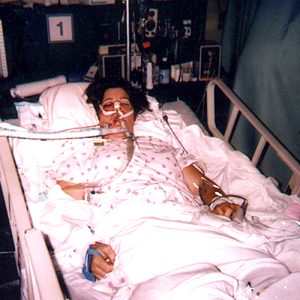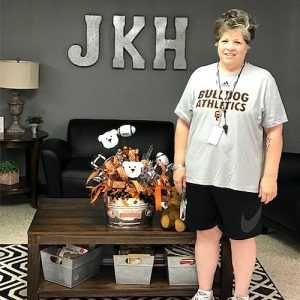 Carla Elliott’s family thought she would be bedridden for life when she suffered a traumatic brain injury (TBI) after an accident at work. Not only did Carla defy all odds and achieve an amazing recovery, she successfully returned to work. Carla says the skills she learned at CNS and the support of her family have enabled her to return to a productive life post-injury, “CNS saved my life, and my positive attitude comes from being so grateful to be able to drive a car, walk, talk, and have a job,” she says. "I re-learned all of these skills at CNS.”
Carla Elliott’s family thought she would be bedridden for life when she suffered a traumatic brain injury (TBI) after an accident at work. Not only did Carla defy all odds and achieve an amazing recovery, she successfully returned to work. Carla says the skills she learned at CNS and the support of her family have enabled her to return to a productive life post-injury, “CNS saved my life, and my positive attitude comes from being so grateful to be able to drive a car, walk, talk, and have a job,” she says. "I re-learned all of these skills at CNS.”
In June of 1996, Carla was working as a Fitness and Athletic Director of a health club in Longview, Texas, when she fell 25 feet from inside the gymnasium’s ceiling while trying to repair a light. The fall left Carla with serious injuries, including a lacerated liver, bruised brain stem, and a traumatic brain injury.
She was immediately rushed to the hospital and underwent emergency surgery to remove her spleen and kidney and soon after fell into a two-week coma. When she woke up, she had no memory and could not speak or walk. “The doctors told my family that my prognosis was poor and that I would mostly be bedridden,” said Carla.
After spending the next three and a half months in the hospital, Carla was admitted to the inpatient program at CNS Dallas through her worker’s compensation insurance.
“She came to us in a minimally conscious state as a result of the damage to the reticular activating system in her brain stem, which regulates sleep-wake transitions,” said Valerie Armstrong, a Training and Development Liaison for CNS Texas. “We were challenged because she could not stay awake and was also unaware of her deficits, making her resistant to therapy,” Valerie continued.
Therapists worked closely together to create an individualized treatment plan for Carla, some of which included aqua therapy, cognitive therapy, and occupational therapy where she was re-taught essential life skills such as feeding, bathing and dressing and caring for her 6-year-old son.
After months of consistent, multidisciplinary therapy, Carla was walking, speaking, and her cognitive skills had significantly improved.
She became determined to return home and get back to work, and she returned to work part-time a mere few weeks after her discharge from CNS but was soon let go from her position.
 Today, Carla is the head coach of a girls volleyball team.
Today, Carla is the head coach of a girls volleyball team.
After losing her job, Carla experienced one challenge after another, including a heartbreaking divorce and custody battle over her son. But in spite of the dire and unfair circumstances, Carla kept moving forward and began taking job opportunities at various independent school districts in Texas.
Before her brain injury, Carla had earned a degree in biology-exercise science and physical education and had dedicated much of her life to coaching. She desired to return to her passion and was thrilled when she received a job offer to coach a junior high school sports team.
“I was also earning my teacher certification and began teaching science when I became certified,” said Carla.
While in her new teaching position, one of Carla’s co-workers introduced her to the love of her life, Larry. “We had an instant connection,” she recalls. “We fell in love and got married the following Spring.”
With a growing teaching career and a new partner by her side, it seemed the darkest hour in Carla’s life was behind her. However, in a cruel twist of fate, Larry became terminally ill with cancer and passed away in August of 2018.
But Carla’s unwavering resilience enabled her to push through her devastation. She moved back to her hometown and focused on overcoming her grief, and was offered a position as head coach of a girls volleyball team. “Instead of focusing on my grief, I focused on implementing the best program possible,” she said.
“My message to new patients is to be grateful that you have been given this opportunity to make yourself better,” she continues. “There are so many people who don’t get the opportunity to come to CNS. I was lucky enough that my worker’s compensation allowed me to have the opportunity.”
Carla was able to overcome extreme challenges and defy all odds by finding the strength within herself to be better every day. Her passion for teaching, coaching, and giving back to others shines through everything she does.
“I wouldn’t be where I am without CNS and the support of my family,” says Carla.
CNS Monthly Newsletter
The latest CNS updates, including events, company information, and patient care developments
The Inside View
Quarterly magazine focused on brain injury research, rehabilitation, and advancements shaping the field
Sign-up for one or both to stay connected with brain injury news and recover